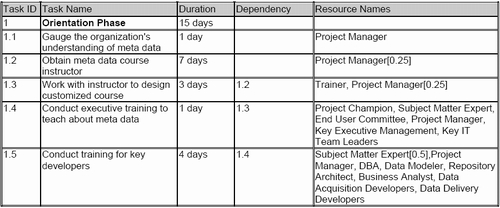Meta Data Repository Project Plan: The Orientation Phase
By David Marco
In this article series, I will be walking through the key tasks in each of the five fundamental phases of a project plan to build a meta data repository: Orientation, Feasibility, Design, Construction, and Rollout. Hey wait a minute…some people may be saying that these are the same phases they use for all of their IT (information technology) projects. This observation is 100% correct. Early meta data repository initiatives tried to make these projects seem like a “black box”, strange and mysterious. This is not the correct approach for having a successful IT project. A meta data repository project has the exact same phases as any other IT project just with some subtle changes.

Table 1: Orientation Phase Tasks
Orientation Phase
The orientation phase is the first phase of the meta data repository’s life cycle. The goal here is to ensure that key people in the company understand the fundamental concepts of meta data and the value of a meta data repository. If, however, I feel that the key people understand meta data and its value and are likely to allocate funds to the project, then I skip this phase as its objectives have already been met. This situation rarely occurs though because most companies are still discovering meta data’s essential value. The orientation phase also gives the project manager or project champion the opportunity to sell the meta data concept to the executives in the company. It is almost always necessary to sell the meta data concept into a company before any funding is allocated. This is why the orientation phase needs to occur before the feasibility phase.
If the project manager has a strong background in meta data and repository implementations, then he or she can be a fine instructor for an orientation class. In most situations however, it is advisable to bring someone in from outside the company to teach the class. This is primarily because a good meta data course (or any course for that matter) requires about 4 to 6 hours of development time for each hour of class time. Because it usually takes a total of about 20 hours of class time, 4 hours for executive training (Table 1, Task ID # 1.4) and 16 hours for detailed developer training (Table 1, Task ID # 1.5), to prepare a company for a meta data implementation. The project manager would need between 80 and 120 hours (i.e., 4 to 6 hours X 20) to prepare for the executive and developer courses. This time can be decreased slightly if the development team is familiar with meta data; in this case, eight hours of training should be sufficient. Table 1 summarizes the training requirements (task ID #6 and #7), along with the other tasks in the Orientation phase.
Of course, finding a qualified meta data course instructor (Table 1, Task ID # 1.2) also takes time; figure on spending about seven days to find the right instructor for the course, negotiate the statement of work, and sign any necessary paperwork. It’s very important that the instructor has actual experience building meta data repositories and not just a theoretical background. In addition, it is best if the instructor is a senior individual, since part of the training task is to sell the concept to executive management. Many companies make the mistake of letting a meta data tool vendor conduct these training sessions. In my experience, a trainer who is “borrowed” from the tool vendor makes the course very “tool focused” and far too technical for management. On the other hand, if the person comes from the vendor’s marketing department, the talk is likely to be relatively non-technical, but still very “tool focused”. These individuals tend to greatly oversell the ease of building a meta data repository. As we know, any major IT effort takes a good deal of work and a repository project is no exception.
The subject matter expert may attend both courses, or just developer training (Table 1, Task ID # 1.5). If this individual will be working on a day-to-day basis with the business analyst, then he or she should attend both sessions.
In the next article, as I will be walking through the Feasibility phase.